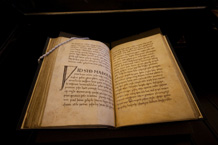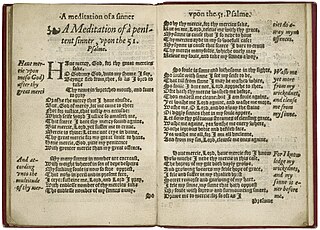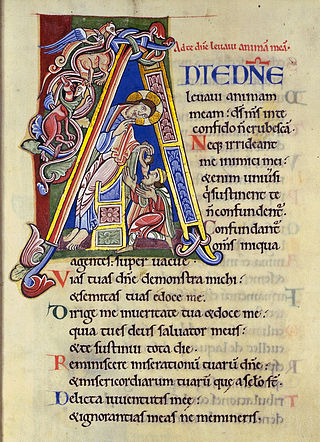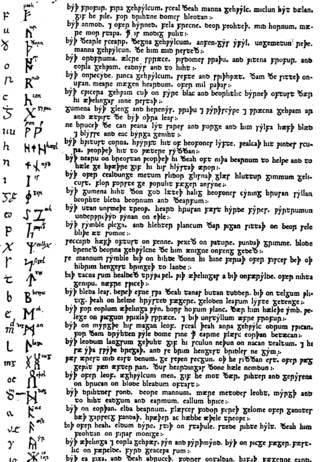Related Research Articles
Old English literature refers to poetry and prose written in Old English in early medieval England, from the 7th century to the decades after the Norman Conquest of 1066, a period often termed Anglo-Saxon England. The 7th-century work Cædmon's Hymn is often considered as the oldest surviving poem in English, as it appears in an 8th-century copy of Bede's text, the Ecclesiastical History of the English People. Poetry written in the mid 12th century represents some of the latest post-Norman examples of Old English. Adherence to the grammatical rules of Old English is largely inconsistent in 12th-century work, and by the 13th century the grammar and syntax of Old English had almost completely deteriorated, giving way to the much larger Middle English corpus of literature.

Cædmon is the earliest English poet whose name is known. A Northumbrian cowherd who cared for the animals at the double monastery of Streonæshalch during the abbacy of St. Hilda, he was originally ignorant of "the art of song" but learned to compose one night in the course of a dream, according to the 8th-century Christian historian and saint Bede. He later became a zealous monk and an accomplished and inspirational Christian poet. He is venerated as a saint in the Eastern Orthodox Church, Roman Catholicism and Anglicanism, with a feast day on 11 February.
The Old English Bible translations are the partial translations of the Bible prepared in medieval England into the Old English language. The translations are from Latin texts, not the original languages.

The Exeter Book, also known as the Codex Exoniensis or Exeter Cathedral Library MS 3501, is a large codex of Old English poetry, believed to have been produced in the late tenth century AD. It is one of the four major manuscripts of Old English poetry, along with the Vercelli Book in Vercelli, Italy, the Nowell Codex in the British Library, and the Junius manuscript in the Bodleian Library in Oxford. The book was donated to what is now the Exeter Cathedral library by Leofric, the first bishop of Exeter, in 1072. It is believed originally to have contained 130 or 131 leaves, of which the first 7 or 8 have been replaced with other leaves; the original first 8 leaves are lost. The Exeter Book is the largest and perhaps oldest known manuscript of Old English literature, containing about a sixth of the Old English poetry that has survived.

The Wanderer is an Old English poem preserved only in an anthology known as the Exeter Book. It comprises 115 lines of alliterative verse. As is often the case with Anglo-Saxon verse, the composer and compiler are anonymous, and within the manuscript the poem is untitled.
"The Rhyming Poem", also written as "The Riming Poem", is a poem of 87 lines found in the Exeter Book, a tenth-century collection of Old English poetry. It is remarkable for being no later than the 10th century, in Old English, and written in rhyming couplets. Rhyme is otherwise virtually unknown among Anglo-Saxon literature, which used alliterative verse instead.

Psalm 51, one of the penitential psalms, is the 51st psalm of the Book of Psalms, beginning in English in the King James Version: "Have mercy upon me, O God". In the slightly different numbering system used in the Greek Septuagint and Latin Vulgate translations of the Bible, this psalm is Psalm 50. In Latin, it is known as Miserere, in Ancient Greek: Ἥ Ἐλεήμων, romanized: Hḗ Eleḗmōn), especially in musical settings. The introduction in the text says that it was composed by David as a confession to God after he sinned with Bathsheba.
Elene is a poem in Old English, that is sometimes known as Saint Helena Finds the True Cross. It was translated from a Latin text and is the longest of Cynewulf's four signed poems. It is the last of six poems appearing in the Vercelli manuscript, which also contains The Fates of the Apostles, Andreas, Soul and Body I, the Homiletic Fragment I and Dream of the Rood. The poem is the first English account of the finding of the Holy Cross by Saint Helena, the mother of Emperor Constantine. The poem was written by Cynewulf some time between 750 and the tenth century. It is written in a West Saxon dialect, but certain Anglianisms and metrical evidence concerning false rhymes suggest it was written in an Anglian rather than Saxon dialect. It is 1,321 lines long.
Christ II, also called The Ascension, is one of Cynewulf's four signed poems that exist in the Old English vernacular. It is a five-section piece that spans lines 440–866 of the Christ triad in the Exeter Book, and is homiletic in its subject matter in contrast to the martyrological nature of Juliana, Elene, and Fates of the Apostles. Christ II draws upon a number of ecclesiastical sources, but it is primarily framed upon Gregory the Great’s Homily XXIX on Ascension Day.

Milton's 1645 Poems is a collection, divided into separate English and Latin sections, of John Milton's youthful poetry in a variety of genres, including such notable works as An Ode on the Morning of Christ's Nativity, Comus and Lycidas. Appearing in late 1645 or 1646, the octavo volume, whose full title is Poems of Mr. John Milton both English and Latin, compos'd at several times, was issued by the Royalist publisher Humphrey Moseley. In 1673, a year before his death, Milton issued a revised and expanded edition of the Poems.
Andreas is an Old English poem, which tells the story of St. Andrew the Apostle, while commenting on the literary role of the "hero". It is believed to be a translation of a Latin work, which is originally derived from the Greek story The Acts of Andrew and Matthew in the City of Anthropophagi, dated around the 4th century. However, the author of Andreas added the aspect of the Germanic hero to the Greek story to create the poem Andreas, where St. Andrew is depicted as an Old English warrior, fighting against evil forces. This allows Andreas to have both poetic and religious significance.

Christ I is a fragmentary collection of Old English poems on the coming of the Lord, preserved in the Exeter Book. In its present state, the poem comprises 439 lines in twelve distinct sections. In the assessment of Edward B. Irving Jr, "two masterpieces stand out of the mass of Anglo-Saxon religious poetry: The Dream of the Rood and the sequence of liturgical lyrics in the Exeter Book ... known as Christ I".

Daniel is an anonymous Old English poem based loosely on the Biblical Book of Daniel, found in the Junius Manuscript. The author and the date of Daniel are unknown. Critics have argued that Cædmon is the author of the poem, but this theory has been since disproven. Daniel, as it is preserved, is 764 lines long. There have been numerous arguments that there was originally more to this poem than survives today. The majority of scholars, however, dismiss these arguments with the evidence that the text finishes at the bottom of a page, and that there is a simple point, which translators assume indicates the end of a complete sentence. Daniel contains a plethora of lines which Old English scholars refer to as “hypermetric” or long.
"The Fortunes of Men", also "The Fates of Men" or "The Fates of Mortals", is the title given to an Old English gnomic poem of 98 lines in the Exeter Book, fols. 87a–88b.

Anne Locke was an English poet, translator and Calvinist religious figure. She has been called the first English author to publish a sonnet sequence, A Meditation of a Penitent Sinner (1560), although authorship of that work has arguably been attributed to Thomas Norton.

The Old English Hexateuch, or Aelfric Paraphrase, is the collaborative project of the late Anglo-Saxon period that translated the six books of the Hexateuch into Old English, presumably under the editorship of Abbot Ælfric of Eynsham. It is the first English vernacular translation of the first six books of the Old Testament, i.e. the five books of the Torah and Joshua. It was probably made for use by lay people.

Psalm 25 is the 25th psalm of the Book of Psalms, beginning in English in the King James Version: "Unto thee, O LORD, do I lift up my soul.". The Book of Psalms is part of the third section of the Hebrew Bible, and a book of the Christian Old Testament. In the slightly different numbering system used in the Greek Septuagint and Latin Vulgate translations of the Bible, this psalm is Psalm 24. In Latin, it is known as "Ad te Domine levavi animam meam". The psalm, attributed to David, has the form of an acrostic Hebrew poem.

Psalm 141 is the 141st psalm of the Book of Psalms, a book of the Hebrew Bible and the Christian biblical canon, that begins in English in the King James Version: "LORD, I cry unto thee: make haste unto me". In the slightly different numbering system used in the Greek Septuagint version of the Bible, and the Latin Vulgate, this psalm is Psalm 140. In Latin, it is known as "Domine clamavi ad te exaudi me".

The Old English rune poem, dated to the 8th or 9th century, has stanzas on 29 Anglo-Saxon runes. It stands alongside younger rune poems from Scandinavia, which record the names of the 16 Younger Futhark runes.

2 Samuel 22 is the twenty-second chapter in the second parts of the Books of Samuel in the Hebrew Bible. According to Jewish tradition the book was attributed to the prophet Samuel, with additions by the prophets Gad and Nathan, but modern scholars view it as a composition of a number of independent texts of various ages from c. 630–540 BCE. This chapter contains a Song of Thanksgiving attributed to King David which corresponds to Psalm 18. It is within a section comprising 2 Samuel 21–24 containing the appendices to the Books of Samuel.
References
- ↑ Fox and Sharma 18.